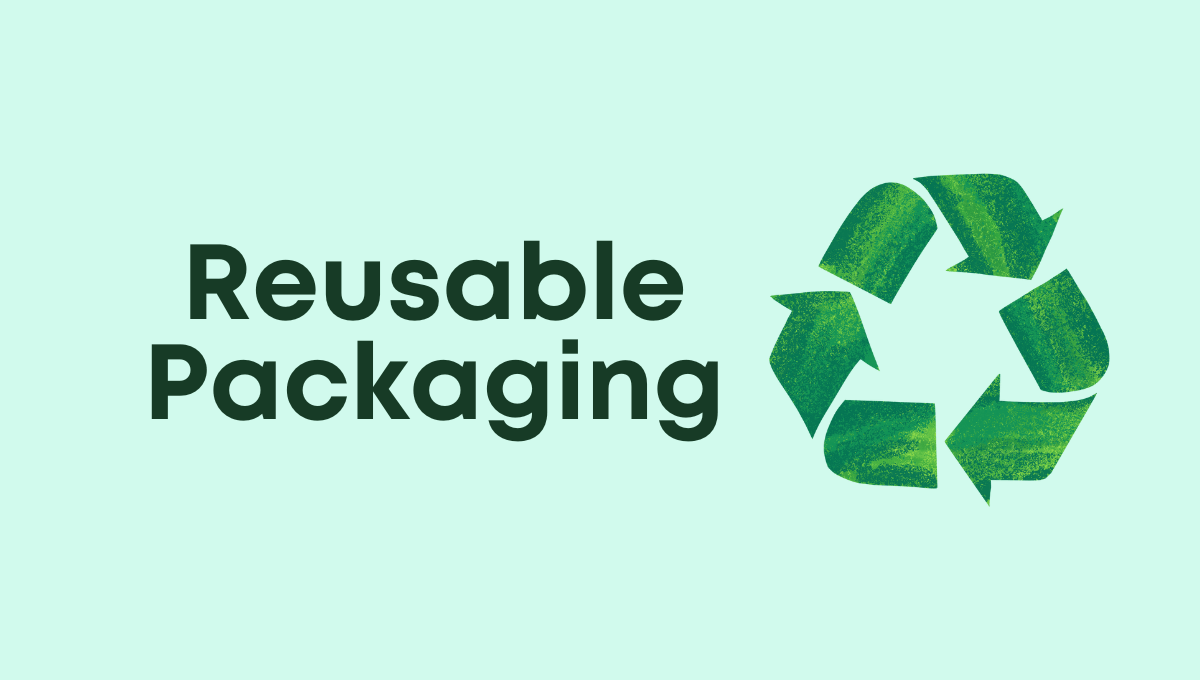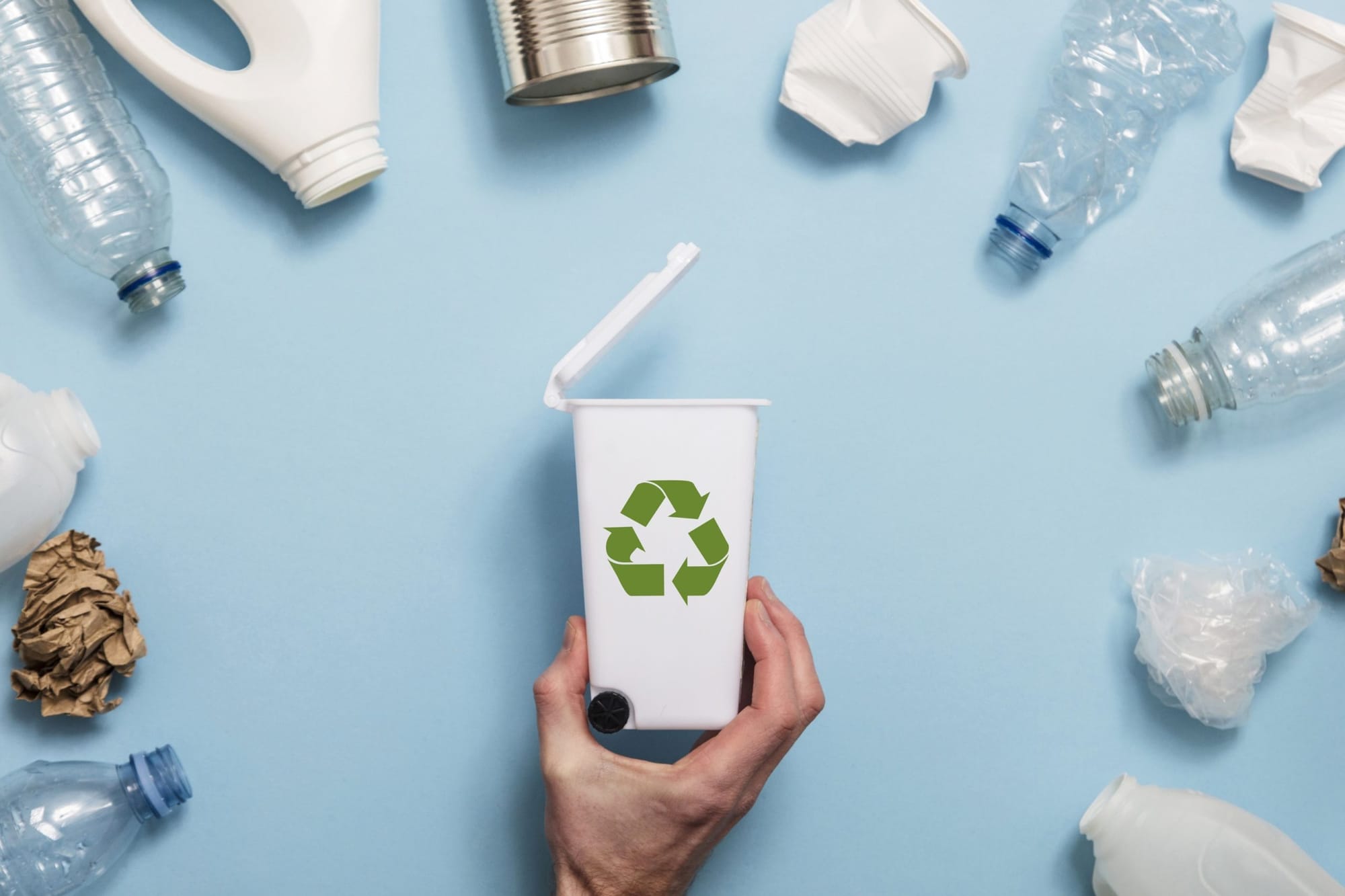What Is Reusable Packaging?

Companies all over the world are encouraged to make decisions and do things that leave a positive impact on society. Businesses want to reduce their carbon footprint and adopt sustainable approaches.
Regarding sustainability, reusable packaging is one of the most important things.
It's a solution and a practice through which you can leave behind traditional approaches and implement an environment-friendly method. There are many characteristics and benefits of reusable packaging.
But is it the right choice for your business?
In this article, we'll discuss briefly about reusable packaging, examples, benefits, and much more that you must know about it.
So keep reading.

Source: alcimed
What Is Reusable Packaging?
Reusable packaging refers to containers, materials, or systems designed and manufactured to be used multiple times for packaging and transporting products before needing replacement or disposal.
Unlike single-use packaging, discarded after one use, reusable packaging is intended for multiple-use cycles, reducing waste and environmental impact.
It is made from materials that are intricately made to be used multiple times. It can be glass, metal, or even any composite material. When you usually get packaging material, it's discarded and goes straight to the trash. There's no recycling.
But that's not the case with reusable package solutions.
Reusable grocery bags are a typical and practical example of this. These are typically made of sturdy materials like canvas, jute, or durable plastics.
So instead of single-use containers or paper bags for groceries, which are not strong, you should use reusable bags. The material used makes them durable and increases their lifespan.
Characteristics & Design Principles
Everything has specific sets of characteristics and designs. Through these, the product fulfills its purpose. So here are some of the characteristics and design principles of reusable packaging.
Durable
What if you use a packaging that claims to be strong, but it can't withstand a large amount of weight? You'll get disappointed and think it's a scam.
However, with reusable packaging, you don't have to worry about it because it is made from strong materials. From handling to storage, everything is done in a way that makes it strong and enhances its structural integrity. So, when making a product package, choose the best material.
Stackability
It's a common practice in Asian households to stack up reusable packaging. So when making it, remember that it should be easy to store.
That's how you can increase the lifespan of your packaging.
Cleanability
If you're stacking up packaging on your shelves, you don't want it to be dirty, Right?
That's why you must ensure that these should be easy to clean and sanitize. Especially for the food and healthcare industries, they should maintain the proper hygienic standards while using them.
Reusable vs. Single-Use Packaging
You might wonder why you shouldn't use single-use packaging.
Aren't both the same thing?
No.
They are completely different, and to make the differences evident, here is a table of differences that distinguishes them from each other.
Benefits and Cons Of Using Reusable Packaging Solutions
There are good and bad sides to everything. That's why you should read both pros and cons before implementing this approach in your business. It'll help you choose the right option for your business according to your target audience and niche.
Pros
- Waste Reduction: It significantly reduces the amount of single-use waste, contributing to a more sustainable and eco-friendly approach.
- Cost Savings: While there's an initial investment in reusable packaging, it pays off in the long run as it can be used multiple times, saving money on frequent replacements.
- Eco-Conscious Behavior: It encourages widespread adoption of more sustainable practices and promotes environmental awareness.
- Environmental Benefits: It helps lower the carbon footprint by reducing the need for manufacturing, transportation, and disposal of single-use package waste.
Cons
- Behavioral Change: Encouraging people to adopt it may require changing consumer behavior and habits, which can be challenging.
- Limited Applicability: It is unsuitable for all products or industries, and some items still require single-use packaging.
7 Reusable Packaging Examples
The applications of these vary greatly in every sector and industry. What does that indicate?
It means every business can follow its unique approach to make this process work in the best favor for the company. Here are some of the industries and applications of boxings used in them.
Food and Beverage Industry
The food and beverage industry is always in its bloom. Because no matter what season it is, people love to eat and drink. The primary examples in this sector are as follows.
Crates
These are usually made of strong plastic and wood. They are used to transport food items from farms to different retail outlets.
Food filled in reusable crates → Transport food items → From farm → Retail outlets
The crates are easy to clean and sanitize, and there's no harm in using them multiple times.
Glass Milk Bottles
For a while, single-use plastic milk containers were heavily used. But now reusable glass bottles are back as an amazing eco-friendly alternative.
So how does it work?
Consumers purchase milk from any store. After the milk is finished, they return the bottles to stores. From there, these bottles are stored, sterilized, and reused again.
Use materials that ensure safety and effective recovery if you sell liquid products.
Refillable Kegs
It's used for draft beer and several other beverages. These can be reused as they are made of stainless steel or plastic.
Ease of cleaning → Refill → Reuse
E-commerce & Retail Sector
E-commerce has seen significant growth, especially after COVID-19. But that means we must adopt eco-friendly options as well to minimize stress on the environment.
Shopping Bags And Totes
Retailers should encourage customers to use reusable bags instead of single-use plastic bags. Totes are the best example of these. They are made from durable and recyclable materials.
They are an environmentally friendly alternative and create many business branding opportunities.
Reusable Containers
E-commerce companies are now using shipping containers that can be reused. But why is that so?
It's to minimize harmful plastic waste.
The containers are made from durable materials and can be used for many purposes. So piling up cardboard boxes is old-fashioned. The new way to ship containers is by adopting sustainable packaging.
Manufacturing & Industrial Applications
Every industry is making an effort to contribute to the environment. Manufacturing and industrial companies can't stand behind. Here are some of the applications in this domain.
Pallets & Containers
For the storage of goods and items, wooden pallets and containers are used. But now, these are reusable, meaning you can use them as often as you want.
It reduces packaging waste and contributes to supply chain efficiency.
Bulk Containers
Plastic containers must be extra sturdy in industries where large volumes of goods are handled. They are made of plastic or metal, which can be stacked easily and minimize transportation costs.
5 Innovative Reusable Packaging Tips
There are different ideas that you can incorporate into your business. Here is a list of 5 ideas that might be a perfect fit for your business.
1. Find Customized Solutions For Your Business
The opportunities are endless. You should explore where you can find customized solutions. You can customize the packages according to your needs and product requirements.
With modulator package designs, there is enhanced flexibility. They are strong enough to accommodate any product size. They are effective in handling and storage at every stage.
2. Use Smart & Innovative Technology
It's time to think outside the box and use technologies that make your customers say WOW. You can use smart technologies like tags, sensors, and QR codes. These have numerous benefits, such as:
- Real-time tracking
- Monitoring your assets
- Ensuring proper management
- Maintenance and return if needed.
Not only this, it also has plenty of other benefits. It promotes transparency, and you can pinpoint areas of improvement.
3. Leverage Collaborative Platforms
Many platforms are emerging to assist businesses in collaborating and using reusable packaging. Not only this, they connect companies with supply chains. The best part is you can share and exchange resources with them.
But how is that beneficial for you?
It'll help you minimize the cost and enhance asset utilization. It also contributes to the reduction of solid waste while ensuring product protection.
4. Check Latest Materials & Designs
In this fast-changing world, it's essential to adapt quickly. You should know the latest trends and whether they are relevant to your business.
When it comes to packaging, you should know which new material is available in the market. For example, biodegradable or compostable packaging materials are present in the market and are suitable replacements for traditional packages.
5. Engage Your Customers
Your customers are the soul of your business. That's why putting extra effort into fulfilling their needs is important.
When adopting eco-friendly alternatives, you should also educate your customers about their importance.
- Share its importance.
- Tell its benefits to users.
- Give incentives to customers who choose reusable options.
You can start programs such as deposit-refund systems. These customers get a discount coupon or refund when they return packaging.
Conclusion
Reusable packaging is becoming a trend that's gaining high popularity in a very short time. It's because it addresses the right problem and provides an effective solution for it.
With it, brands can contribute to reducing wastage and carbon footprint. Also, there is a wide range of economic benefits, such as cost savings and a better supply chain. That's why companies with forward-thinking are quick to spot trends and are already implementing this innovative trend. This leads to an increase in return on investment and customer loyalty.
Remember, packaging is no longer just a means to cover your product. Instead, it's a way to make your product stand out, grab customers' attention, voice your brand values, and much more.
All you need is the right strategy and suppliers to guide you in this journey. If you're looking for expert guidance, then professionals at Altro Labels are ready to assist you. Contact us today.
